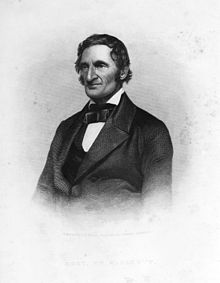William Alcott
William Andrus Alcott (born August 6, 1798 in Wolcott , † March 29, 1859 in Auburndale ) was an American doctor, life reformer and author.
Life
The physician William A. Alcott was in demand all his life as a speaker and as the author of various advice and decency literature . From 1839 - after a lifelong aversion to meat and fish - Alcott gave up all consumption of animal products. Alcott was convinced throughout his life that a vegetarian diet brought health benefits and that a vegetarian culture could generally enrich society morally because, on the one hand, violence against other animals would end and people, on the other hand, practiced controlling their "lower instincts" .
William Alcott worked a lot with his cousin Bronson Alcott . Bronson founded the Fruitlands Commune in Massachusetts, where he tried out many of William's lifestyles. Both maintained extensive correspondence and discussed their publications with one another.
William Alcott himself took no active part in building the commune and instead lectured nationwide on the early vegetarian movement. At the founding meeting of the Vegetarian Society in 1850, convened on the initiative of William Metcalfe and Sylvester Graham , Alcott was elected President. The content of the society revolved around the "superiority of the vegetarian way of life" and argued predominantly with views on the health positive effects of a vegetarian diet. The meeting was deemed successful and a publication soon circulated among vegetarian and reformist circles. Alcott was then living in Auburndale . Alcott died in 1859 at the age of 60 of tuberculosis, which he had suffered from since childhood. His grave is in Newton Cemetery .
Publications
WorldCat maintains a list of 188 works by William Alcott. His most widely read publications include:
- Confessions of a School Master , 1839
- The Young Man's Guide , 1834
- The Young Woman's Guide
- The Use of Tobacco: Its Physical, Intellectual, and Moral Effects on The Human System , 1836
-
Vegetable Diet: As Sanctioned by Medical Men, and by Experience in All Ages , 1838 (2nd, revised and enlarged edition: New York 1859).
- In the first four chapters, the translation into German has been greatly revised: Theodor Hahn : The natural diet - the diet of the future. Compiled from experience and science of all times and peoples. Paul Schettler, Cöthen 1859.
- Tea and Coffee , 1839
- Art of Good Behavior , 1848
- The Young Housekeeper , 1842
- The Young Mother Or Management Of Children In Regard To Health
- The Young Mother
- Adventures of Lot, the Nephew of Abraham
- Familiar letters to young men on various subjects: Designed as a companion to The young man's guide.
- Trust in the lord; or the Story of Elijah and the Ravens
- Stories of Eliot and the Indians
- Lectures on Life and Health, Or, The Laws and Means of Physical Culture , 1853
- The House I Live In The first Anatomy book for the general public.
- Forty Years in the Wilderness of Pills and Powders , 1859
- The laws of health, or, Sequel to "The house I live in" , 1859
literature
- Samuel Orcutt: History of the Town of Wolcott, Connecticut, From 1731 to 1874, with an Account . Heritage Books, Inc., 2012, ISBN 0788451464 , pp. 265-267.
- Margaret Puskar-Pasewicz: William Alcott . In: Cultural encyclopedia of vegetarianism . Greenwood, Santa Barbara, CA 2010, ISBN 9780313375569 , pp. 19-20.
Individual evidence
- ↑ a b (Orcutt 2012)
- ^ List of 188 works by William Alcott
- ^ Confessions of a School Master
- ^ The Young Man's Guide
- ↑ The Young Woman's Guide
- ^ The Use of Tobacco: Its Physical, Intellectual, and Moral Effects on The Human System
- ↑ Vegetable Diet: As Sanctioned by Medical Men, and by Experience in All Ages
- ^ Robert Jütte : History of Alternative Medicine. From folk medicine to today's unconventional therapies. CH Beck Verlag, Munich 1996, ISBN 3-406-40495-2 , p. 156.
- ^ Tea and Coffee
- ↑ The laws of health, or, Sequel to "The house I live in"
| personal data | |
|---|---|
| SURNAME | Alcott, William |
| ALTERNATIVE NAMES | Alcott, William Andrus; Alcott, William A. |
| BRIEF DESCRIPTION | American doctor, life reformer, and author |
| DATE OF BIRTH | August 6, 1798 |
| PLACE OF BIRTH | Wolcott |
| DATE OF DEATH | March 29, 1859 |
| Place of death | Auburndale |
